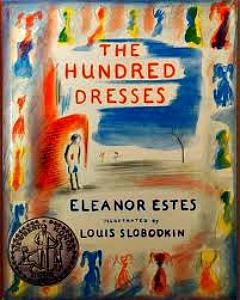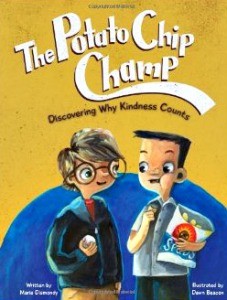
The Horn Book website has lots of material of interest to teachers. Here are some areas to explore. And follow us on Twitter: #lollysclass
|
Interviews with authors and illustrators Recommended books -- reviews and themed book lists |
School -- reading in school, author visits, and more Suggestion box: what else to you want to see in Lolly's Classroom? |
Empathy spells understanding
If there’s one thing my students have come to know about their teacher, Ms.
 If there’s one thing my students have come to know about their teacher, Ms. Tell, it’s that I have an extreme passion for, and knowledge of, the Harry Potter series. I won’t get too much into it (I’ll save that for another blog post), but it’s true. It’s not just the magical characters and enchanting spells that draws me towards the series; it’s that as I’ve grown older, I’ve been able to appreciate some of its deeper lessons, concerning the acceptance of others that may seem “different,” and the notion of taking responsibility for your actions.
If there’s one thing my students have come to know about their teacher, Ms. Tell, it’s that I have an extreme passion for, and knowledge of, the Harry Potter series. I won’t get too much into it (I’ll save that for another blog post), but it’s true. It’s not just the magical characters and enchanting spells that draws me towards the series; it’s that as I’ve grown older, I’ve been able to appreciate some of its deeper lessons, concerning the acceptance of others that may seem “different,” and the notion of taking responsibility for your actions.It was in the midst of my daily Google search that I came across an article in New York Magazine entitled, “Can Harry Potter Teach Kids Empathy?” Well, if I see Harry Potter in a headline, you can guarantee that I’ll click that link. Now, while Harry Potter was definitely used as a hook to draw readers into the article, I became more enthralled by the ongoing study being described in which research has begun to discover that reading fiction can have major impact on one’s social perceptions and understanding of different viewpoints around the world.
In lieu of the holidays and the spirit of the new year, the time that dedicates itself to appreciating what you have and offering up new resolutions to better oneself, my mind shifted towards what I truly believe to be one of the most important facets of a child’s education — shaping character. Thinking about whether or not we are raising our students to be genuine, kind men and women of society can often fall to the wayside in favor of mastering multiplication facts for the test or meeting the deadline in completing a personal narrative report. This year, my class has taken a particular look at the word empathy, which we’ve come to define as, “I’ll try to imagine how it is you are feeling before I speak or do anything.” This definition has served as a guidepost for how we host discussions in third grade, how we find our “teachable moments,” and how we select our Read Alouds!
I’ve compiled a list of Read Aloud texts (some picture books, some chapter books) that have not only sparked incredible discussion post-reading, but have also seeped their way into discussions throughout our school day. Empathy is at work when a child has a rough time losing in the competitive handball game at gym, or someone feels left out when her friends race over to the swings without her. Books have served as an indirect confidante for when those moments become too big for students to express themselves. In a moment of clarity, books can help them think about how someone else may be feeling.
Here is our Read Aloud list for empathy:
- The Hundred Dresses by Eleanor Estes
- The Potato Chip Champ by Maria Dismondy
- Uncle Rain Cloud by Tony Johnston
- Wilfrid Gordon McDonald Partridge by Mem Fox
- Wonder by R.J Palacio
- Yang the Youngest and His Terrible Ear by Lensey Namioka






RELATED
RECOMMENDED
ALREADY A SUBSCRIBER? LOG IN
We are currently offering this content for free. Sign up now to activate your personal profile, where you can save articles for future viewing.







Add Comment :-
Be the first reader to comment.
Comment Policy:
Comment should not be empty !!!